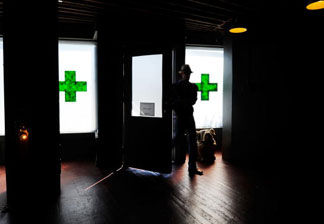An appellate court ruled California’s medical marijuana law doesn’t protect dispensaries from raids or prosecution by the federal government.
The 9th U.S. Circuit Court of Appeals, located in San Francisco, ruled Jan. 15 that medical pot shops in the state are subject to criminal charges, raids and lawsuits by the government despite California’s MMJ law.
The decision was no surprise. In upholding three rulings by lower courts, it simply reaffirmed a previous decision from 2007 and rulings by other federal courts.
 Medical pot has been legal in California since 1996, when voters approved Proposition 215. Several years later, the legislature passed a bill instituting some aspects of the program. Not long after, dispensaries started proliferating across the state.
Medical pot has been legal in California since 1996, when voters approved Proposition 215. Several years later, the legislature passed a bill instituting some aspects of the program. Not long after, dispensaries started proliferating across the state.
Though medical weed is legal here under state law, all pot is illegal under federal law. Authorities under both the Bush and Obama administrations have aggressively targeted California’s dispensaries, in large part because of a widespread belief the state has too little regulation and too much abuse.
That attitude, and constant pressure from Washington, D.C., made for a hostile environment for dispensaries in much of the state. Local communities started banning them outright, and the state Supreme Court endorsed that tactic last year. Many of those localities joined up with federal law enforcement to target pot shops for criminal prosecution.
Paradoxically, even as the state seemed to turn against these stores, public support for full legalization – which would only bring more pot into more neighborhoods – has jumped by leaps and bounds. Whether because of differences in turnout between elections or simple indecisiveness, voters seem to support the idea on one hand and elect local leaders to kill it on the other.
With such a contradictory and chaotic set of affairs, dispensaries need all the legal protection they can get. But they weren’t likely to get any from the 9th Circuit.
That’s because federal law usually takes precedence over state law. A state statute may say weed is legal, but if a federal statute says otherwise, it’s the latter that counts in the end – assuming there’s an arrest, prosecution or lawsuit.
Medical marijuana is now legal in 19 states, and another two have legalized recreational cannabis: Colorado and Washington. The federal government could attempt to shut down all these programs, but the Justice Department announced in August that it wouldn’t – as long as states enforced rigid federal priorities such as reducing drug violence.
 California Marijuana Market Breaking "Marijuana News" from CA
California Marijuana Market Breaking "Marijuana News" from CA


